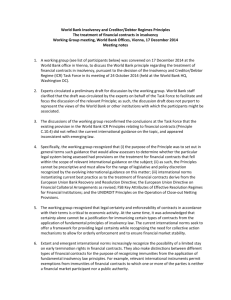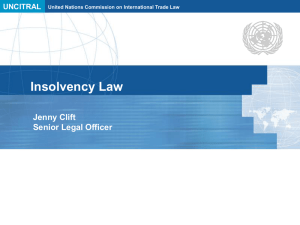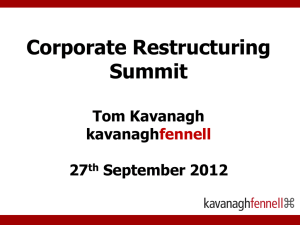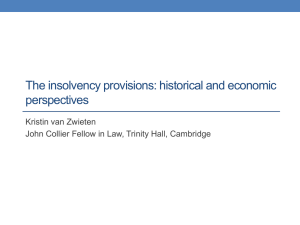Insolvent company investigations: what we do
advertisement
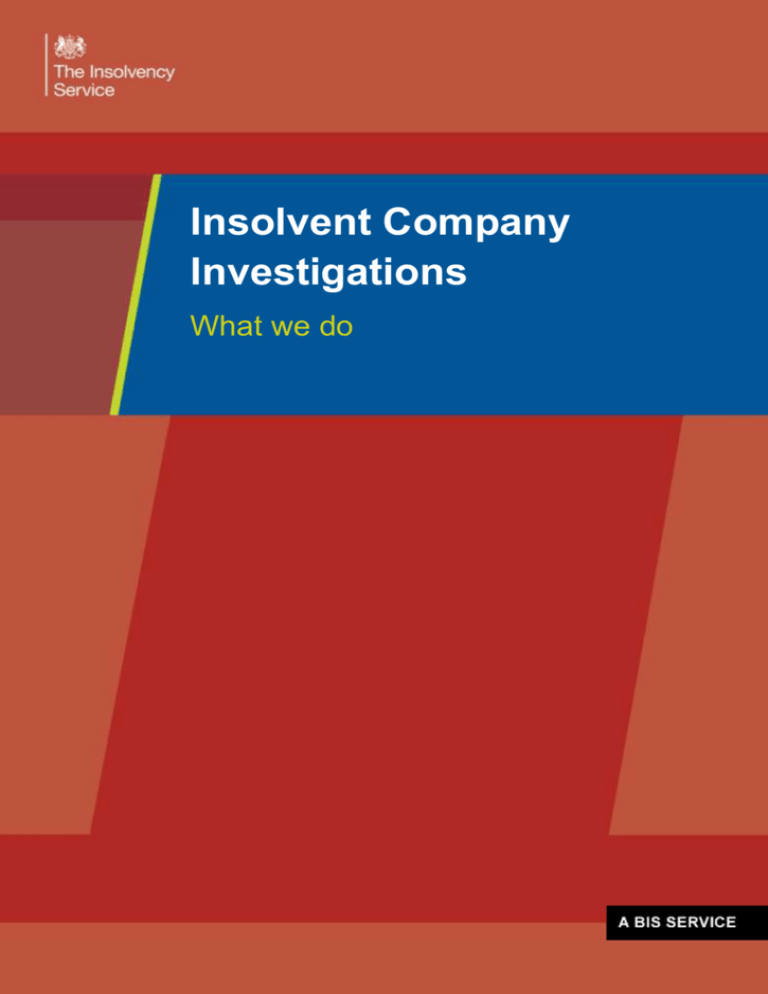
Insolvent Company Investigations What we do 1 Contents Introduction ................................................................................................................ 3 What can directors of insolvent companies do? ......................................................... 4 What is unfit conduct? ................................................................................................ 4 The law....................................................................................................................... 4 What can we investigate? .......................................................................................... 5 Who can we investigate? ........................................................................................... 6 How we investigate .................................................................................................... 6 How we decide whether to take disqualification proceedings ..................................... 7 The public interest ...................................................................................................... 7 Our enforcement results ............................................................................................. 8 How to find a disqualified director or company insolvency details .............................. 8 Search for a disqualified director............................................................................. 8 Find out if a company is in formal insolvency and who is dealing with the company ................................................................................................................................ 9 How to complain ....................................................................................................... 10 Complain about a company in compulsory liquidation or its directors ................... 10 Complain about other companies in formal insolvency or their directors .............. 10 Complain about a disqualified director or a bankrupt acting as a director of a company ............................................................................................................... 10 Complain about the re-use of a prohibited name .................................................. 10 Other ways to complain ........................................................................................ 11 Documents ............................................................................................................ 11 Contact us ................................................................................................................ 11 Further information ................................................................................................... 11 Other matters ........................................................................................................... 11 Media enquiries..................................................................................................... 11 Data Protection Act ............................................................................................... 11 2 Introduction This guide refers to investigations by the Insolvency Service (the Service) into companies that have entered into formal insolvency proceedings – which means administration, administrative receivership, voluntary and compulsory liquidation – in England, Wales and Scotland. We provide information elsewhere about our investigations into companies and limited liability partnerships which are actively trading, or which have ceased trading without entering into insolvency proceedings. To read this, please go to our publication ‘Company Investigations – What we do’ at www.gov.uk/government/publications/the-insolvency-service-companyinvestigations-what-we-do. If our investigation finds unfit conduct by a director, we may make an application to the court to disqualify them from taking part in the management of companies without the court’s permission. Misconduct by directors is only one of many possible reasons a company fails. So in most cases directors who have been involved in a failure should be able to try again, and should only be disqualified if there is evidence of wrongdoing or unfit conduct. The Company Directors Disqualification Act 1986 (CDDA) aims to maintain the integrity of the business environment. Those who become directors of limited companies should: Carry out their duties honestly and responsibly Ensure they and the company comply with the law and all relevant regulations Exercise adequate skill and care with proper regard to the interests of the company’s creditors, customers, shareholders, employees and, in some circumstances, the public. The majority of directors do this effectively. However, where they do not, the CDDA is a powerful tool we can use against those who abuse the privilege of limited liability. More information about company director disqualification is available on our website at www.gov.uk/insolvency-service. 3 What can directors of insolvent companies do? Directors of insolvent companies are legally entitled to act as directors of any other company, including forming a new company to carry on a business similar to, or even identical to, that of the former company so long as they are not: Disqualified from taking part in the management of a limited company An undischarged bankrupt Subject to a debt relief order Subject to bankruptcy or debt relief restrictions. But there are restrictions on the re-use of the former company name, including any trading name, by directors of a company that has entered into voluntary or compulsory liquidation. This is known as a prohibited name. You can find out more about prohibited names at www.gov.uk/government/publications/insolvencyrestrictions-on-re-use-of-a-company-name. What is unfit conduct? There is no finite list of conduct that may lead to disqualification. But examples include: Continuing to trade to the detriment of creditors at a time when the company was insolvent Conduct that deliberately deprives creditors of assets Fraudulent behaviour Failure to keep or deliver up appropriate accounting records Failure to prepare and file accounts or make returns to Companies House Failure to submit tax returns or pay over to the Crown tax or other money due Letting somebody else run the company for you or failing to ensure it is run properly Failure to comply with other regulatory requirements Failure to co-operate with the official receiver or insolvency practitioner. Unfit conduct in overseas companies after 1 October 2015 may also be taken into account. 4 The law The Service fulfils a range of statutory functions. We exercise powers and duties for the Secretary of State as set out in the Insolvency Acts 1986 and 2000, the Company Directors Disqualification Act 1986 and the Companies Acts 1985 and 2006, as well as many regulations relating to these acts. To access the legislation, please visit www.legislation.gov.uk. We take disqualification proceedings to court under civil law, not criminal law. Our disqualification proceedings do not affect the right of the insolvency practitioner or creditors to take their own civil proceedings against the directors regarding losses sustained as a result of their unfit conduct. Compensation orders may be sought in cases where the conduct for which a person has been disqualified has led to a direct loss to creditors and no, or insufficient, action has resulted from the insolvency process. The conduct must have occurred after 01 October 2015. It is a criminal offence to breach a disqualification order, undertaking or other restrictions such as a bankruptcy restrictions order by acting as a director without the court’s permission. Penalties range from a fine to up to two years in prison. Any breach may also make the individual personally liable for the company’s debts incurred during the breach. A company’s officers and managers can also be punished if they allow a disqualified person to act in breach of the restriction. What can we investigate? Complaints against companies in compulsory liquidation in England and Wales are dealt with by the official receiver, who will report any matters of concern to the Secretary of State. If a company has entered into compulsory liquidation in Scotland or non-compulsory formal insolvency proceedings – which means administration, administrative receivership and voluntary liquidation – in England, Wales and Scotland, then it is the insolvency practitioner appointed who is initially responsible for dealing with any complaints. (The insolvency practitioner will be called the liquidator, administrator or receiver of the company.) They have a legal duty to send a report to the Secretary of State on the conduct of the directors. This report is confidential and subject to the Data Protection Act; so it cannot be disclosed to third parties such as creditors. 5 (Note: this requirement to report does not apply where a company voluntary arrangement has been agreed with creditors.) The Service, acting for the Secretary of State, reviews the reports from insolvency practitioners and any other information received. If we decide there is sufficient reason to investigate and that investigation is in the public interest (see below), we may do so with a view to disqualification. (Note: any action on the recovery of assets and case administration remains the responsibility of the insolvency practitioner.) The Service does not conduct criminal investigations. If it seems that the company or its officers may have committed criminal offences or other regulatory breaches, we may, if appropriate and legal to do so, pass the relevant information to prosecution lawyers working for BIS (the Department for Business, Innovation and Skills), the police, a regulator or other investigation agencies. It is for that organisation to decide whether it is right for them to carry out any criminal or civil investigation. This does not prevent the investigator including details of the unfit conduct in any disqualification report they may submit. Who can we investigate? We can investigate the people who have controlled a company, whether or not they are described as being a director. In addition to company directors and people acting as company directors without being legally appointed, we can investigate the conduct of shadow directors and others who have instructed a director, who is subsequently disqualified, to act in an unfit manner. Regarding a company, shadow director means, “a person in accordance with whose directions or instructions the directors of the company are accustomed to act”. Shadow directors use other people to front a company for them. The CDDA applies both to individuals and corporate entities that act as directors of other companies. How we investigate We tailor every investigation to the matters being considered. The investigation may include, but not be restricted to: Correspondence with or interview (or both) of the company’s officers and other key parties A review of the company’s accounting and other records Case-specific enquiries of creditors, suppliers, employees and other associated parties such as an insolvency practitioner, accountants, solicitors, banks, HMRC. 6 The progress of the investigation is recorded and then reviewed by a line manager at regular intervals to ensure it stays focused and is in the public interest to be continued. If there is evidence of misconduct to the standards required by the court and disqualification seems to be in the public interest, the investigator will submit a full report to an independent Authorisation Team in the Insolvency Service. They decide for the Secretary of State whether to authorise starting disqualification proceedings in court. How long we take to complete an investigation will depend on its complexity and such factors as how much co-operation we get. However, most of our applications for disqualification (on the Secretary of State’s behalf), are made for an order under section 6 of the CDDA. In such cases if the first date of insolvency (i.e. the first winding-up order, voluntary liquidation, administrative receivership or administration) is before 01 October 2015 then the application for disqualification must be made within 2 years, otherwise a 3 year limit applies unless the court agrees to extend that time. How we decide whether to take disqualification action An independent Authorisations Team in the Insolvency Service, acting for the Secretary of State, consider the investigator’s report. They look at whether the investigator has sufficient evidence for disqualification, and whether it is in the public interest to apply to the court for a disqualification order. Regularly and whenever new information comes to light, the decision to take proceedings is reviewed to see if it remains in the public interest to continue them. If not, the proceedings will stop. The public interest If there is sufficient evidence to bring a case, we normally do so unless there are public interest reasons not to. Public interest factors we consider include the following: Deterrence and the improvement of corporate standards – by deterring both the individual and others from doing similar acts in the future. Public protection – disqualification stops a person abusing the privilege of limited liability. 7 Publicity of disqualifications and the public register of disqualified directors maintained by Companies House ensure that everyone may identify those found unfit to run a company. People can then make an informed decision whether or not to deal with them in the future. Fair and just – taking proceedings should be seen by the average person or business to be justifiable and reasonable in the context of the individual case. Sometimes, even when there is sufficient evidence to prove clearly that a director is culpable (i.e. at fault), it will not be in the public interest to take proceedings. Examples include where the defendant is seriously ill, or cases where the misconduct was so long ago that there would be great difficulty for: • The defendant to get access to information to present a proper defence, or • The witnesses to clearly recall events. Effective use of public money – the Service must make effective use of taxpayers’ money, so bringing a case must merit the expense. Our enforcement results The Service has a general duty to deter unfit conduct by company directors. One way we do this is to publish details of our successful disqualification results, including details of the unfit conduct that led to our enforcement action. We publish them by maintaining the online disqualification search facility found at www.insolvencydirect.bis.gov.uk/IESdatabase/viewdirectorsummary-new.asp. We publish new results to the page on a weekly basis and keep them accessible for 3 months from publication. A disqualification may last up to 15 years and you can contact us to obtain details of current disqualifications that are not displayed. In some cases the Service also issues a press release to increase public awareness of the consequences of unfit corporate behaviour. You can find out more about our enforcement action including statistical data in our Annual Report and Accounts. These are in our Corporate Reports at www.gov.uk/government/organisations/insolvency-service/about. How to find a disqualified director or company insolvency details Search for a disqualified director Companies House maintains the Disqualified Directors Register, and you can access it without charge by visiting www.companieshouse.gov.uk and going to the ‘Find Company Information’ page; then click on ‘Disqualified Directors Search’, which is at the top right of the screen, or telephone 0303 1234 500. 8 Find out if a company is in formal insolvency and who is dealing with the company Companies House maintains the register of companies and their current trading status. You can access it without charge at www.companieshouse.gov.uk under ‘Find Company Information’, or telephone 0303 1234 500. 9 How to complain Complain about a company in compulsory liquidation or its directors If the company entered into compulsory liquidation (it was wound up by the court) in England or Wales, you should complain to the official receiver responsible for the case. Complain about other companies in formal insolvency or their directors Complaints about a company that is in administration, administrative receivership and voluntary liquidation should first be raised with the insolvency practitioner responsible for the insolvency as they may be best placed to deal with the issue. The insolvency practitioner must report any unfit conduct to us. We can then decide whether to investigate further with a view to disqualification. You can also complain to the insolvency practitioner if the company entered into compulsory liquidation in Scotland. If you are not sure whether the company is in fact insolvent, or you have a good reason not to want to make the complaint direct to the insolvency practitioner, then please email or post your complaint to us. We will forward your message to the right person – let us know if you do not want us to do this. Complain about a disqualified director or a bankrupt acting as a director of a company You may want to report a disqualified director, an undischarged bankrupt, somebody subject to a debt relief order or somebody subject to bankruptcy/debt relief restrictions orders and undertakings whom you believe is taking part in the promotion, formation or management of a limited company without leave of the court. If so, please complete our online breach questionnaire at www.gov.uk/report-adisqualified-director. Complain about the re-use of a prohibited name If you wish to report the re-use of a prohibited name, please complete our online breach questionnaire at www.insolvencydirect.bis.gov.uk/contactus/hotlineform.htm. 10 Other ways to complain If you would prefer to complain by email or post, please see our contact details below. Documents If you have any documents to support your complaint, please tell us about your complaint first. If the matter goes forward, we will contact you about any relevant documents. Contact us Intelligence Hub Investigations and Enforcement Services The Insolvency Service 4th Floor, Cannon House 18 Priory Queensway Birmingham B4 6FD Email: Intelligence.live@insolvency.gsi.gov.uk Further information For more information and publications about our investigations and enforcement work, visit www.gov.uk/government/collections/insolvency-service-investigationsand-enforcement-what-we-do-our-outcomes-and-complaints. Other matters Media enquiries Media enquiries should be directed to our Press Office press.office@insolvency.gsi.gov.uk. Data Protection Act Our Personal Information charter explains how we treat personal information. You can find it at www.gov.uk/government/organisations/insolvencyservice/about/personal-information-charter. 11 © Crown copyright 2015 You may re-use this information (not including logos) free of charge in any format or medium, under the terms of the Open Government Licence. To view this licence, visit www.nationalarchives.gov.uk/doc/open-government-licence/ or write to the Information Policy Team, The National Archives, Kew, London TW9 4DU, or email: psi@nationalarchives.gsi.gov.uk. This publication is also available on our website at www.bis.gov.uk/insolvency. October 2015 12

